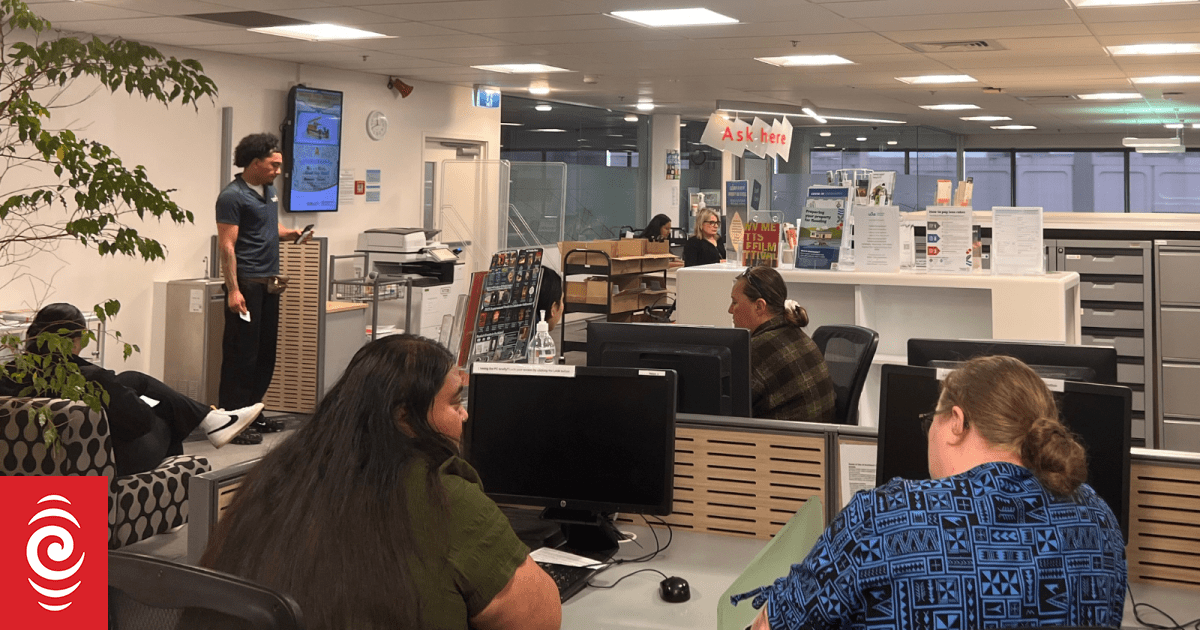Voting has concluded in Auckland’s local elections.
Photo: Mary Afemata / LDR
Long queues formed at special-vote stations across Auckland, including Manukau Library, as residents made a last-minute effort to ensure their votes were counted before the polls closed at midday.
At Manukau Library, students, parents and grandparents lined up together. For many, this was their first or only opportunity to participate in this year’s local elections.
“I had just recently moved back to Auckland,” said 26-year-old Māori student Kayla Ihimaera from Manukau. “My address wasn’t assigned for Auckland, so I didn’t get my forms in time and had to do a special vote,
Photo:
“Honestly, it was my nan – she made sure I came. I forgot, but lucky we came to Manukau.”
Also in the queue was Lani Ah Chong, a University of Auckland student, who arrived with her grandmother to help her vote, after already casting her own earlier.
“It was very important,” she said. “The local elections don’t just affect the youth, they affect the older generations too.”
Ah Chong is part of a small, but motivated group of young Pacific and Māori voters trying to increase turnout in Aotearoa’s lowest-participating region.
“Only 16 percent of us have voted in Ōtara, Papatoetoe and Māngere – that’s the lowest in the whole country,” she said. “It’s crazy that people don’t even know it’s local elections.
“I believe it’s your voice. If you don’t vote, then your voice isn’t being heard.”
Stay tuned for Auckland local election results.
Photo: AUCKLAND COUNCIL / LDR
Another last-minute voter at Manukau Library was Māngere mother and first-generation Sāmoan New Zealander Naomi Tasolo.
Tasolo said she could only recall voting once or twice in previous local elections, as she had not known much about them before. This time, she made sure her vote counted, noting that social media and word-of-mouth reminders played a big role.
“I think I saw something on social media and then I realised I could still cast a special vote,” she said. “Maybe they need to go into churches, because our parents don’t really push stuff.”
Now a ratepayer, Tasolo has started paying closer attention to how local decisions affect South Auckland.
“Now I’m a ratepayer, I care about where my money is going,” she said. “Our facilities are not that great, our infrastructure hasn’t really been updated and it’s 100 percent impacting South Auckland communities, because they are subdividing the crap out of our suburbs.”
She said the voting experience did not carry the excitement or visibility of a major civic event.
“It doesn’t feel like election day,” she said. “I walked through and saw the big orange thing outside, but if I was just driving past, I wouldn’t even know.
“If I didn’t know I had to come to a library, I wouldn’t even know, so no, it doesn’t really feel like election day.”
She also challenged those who stayed home, saying: “There is power in numbers and you can’t be part of that number, if you don’t come and vote.
“I don’t want to hear you complaining, if you didn’t vote.”
For Ihimaera, voting was a personal reminder that civic awareness grew with age and experience.
“Now that I’m getting older and feel like it’s affecting me more, it’s more important, but I think I just need to educate myself more on this topic,” she said.
“It’s cool seeing younger parents and their kids coming in. When I used to work for the elections, I’d only see older people.”
Despite the lively scenes at Manukau, Auckland’s overall voter turnout remains near historic lows. As of Friday, 10 October, turnout was at 23.1 percent, which was six percentage points lower than the same time in 2022.
The last-minute rush of Aucklanders submitting their votes ended at midday, when council staff sealed all vote boxes across the region. The final votes are now being sent to Election Services for counting and will be included in preliminary results on Monday, 13 October.
Auckland Council governance and engagement general manager Lou-Ann Ballantyne said: “Anecdotally, we’ve heard people didn’t know who to vote for.
“Typically, when voters are unsure about candidates or are happy with the status quo, they are likely to abstain from voting and this could be a reason for the decrease in turnout. There is no straightforward solution to get more Aucklanders voting.
“However, we’re pleased with the number of vote boxes dispatched and all our efforts to make postal voting more accessible. As always, we’ll review our processes to improve future participation.
“Now’s the moment many of us have been anticipating – when we find out who will lead Auckland for the next three years.”
Progress results were expected on Vote Auckland on Saturday afternoon, reflecting about 90 percent of all votes cast, and indicating provisional winners for mayor, ward councillors and local board members.
Some races were expected to be close and results may shift, once Saturday’s votes were counted and released.
Final results, including validated special votes, would be declared on Friday, 17 October.
More information about the Auckland local elections was available at Vote Auckland.
LDR is local body journalism co-funded by RNZ and NZ On Air.

